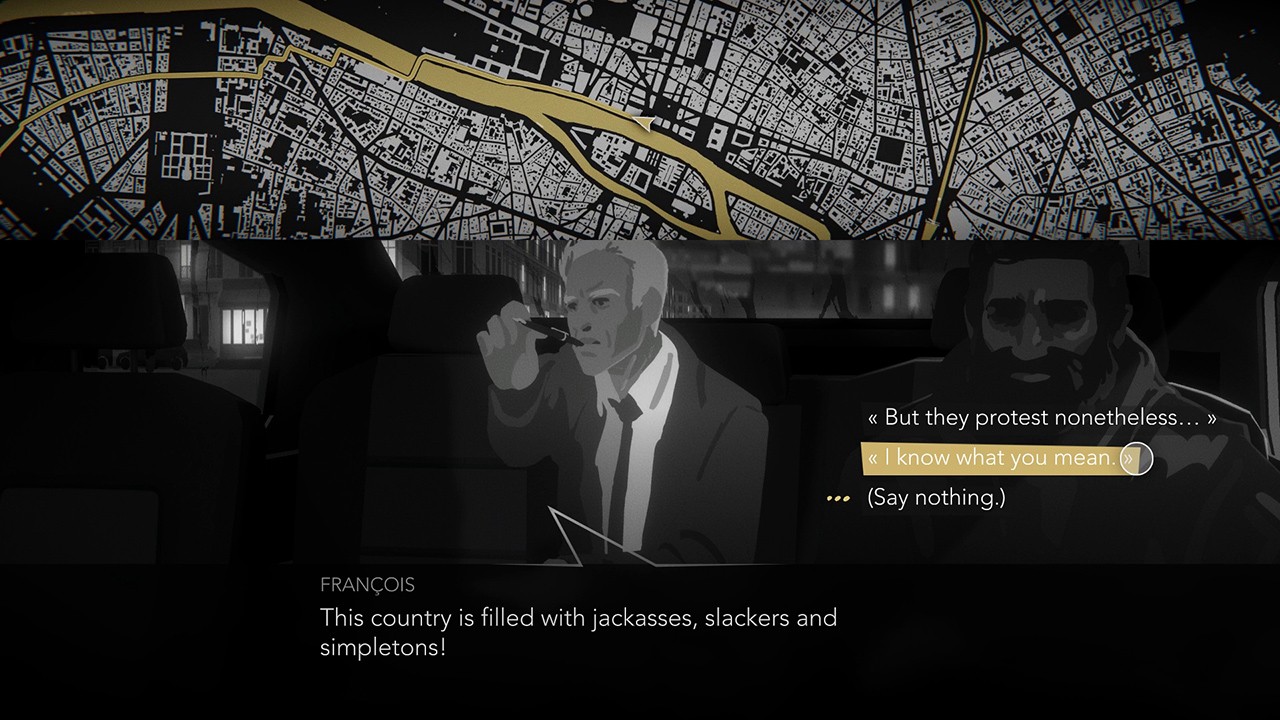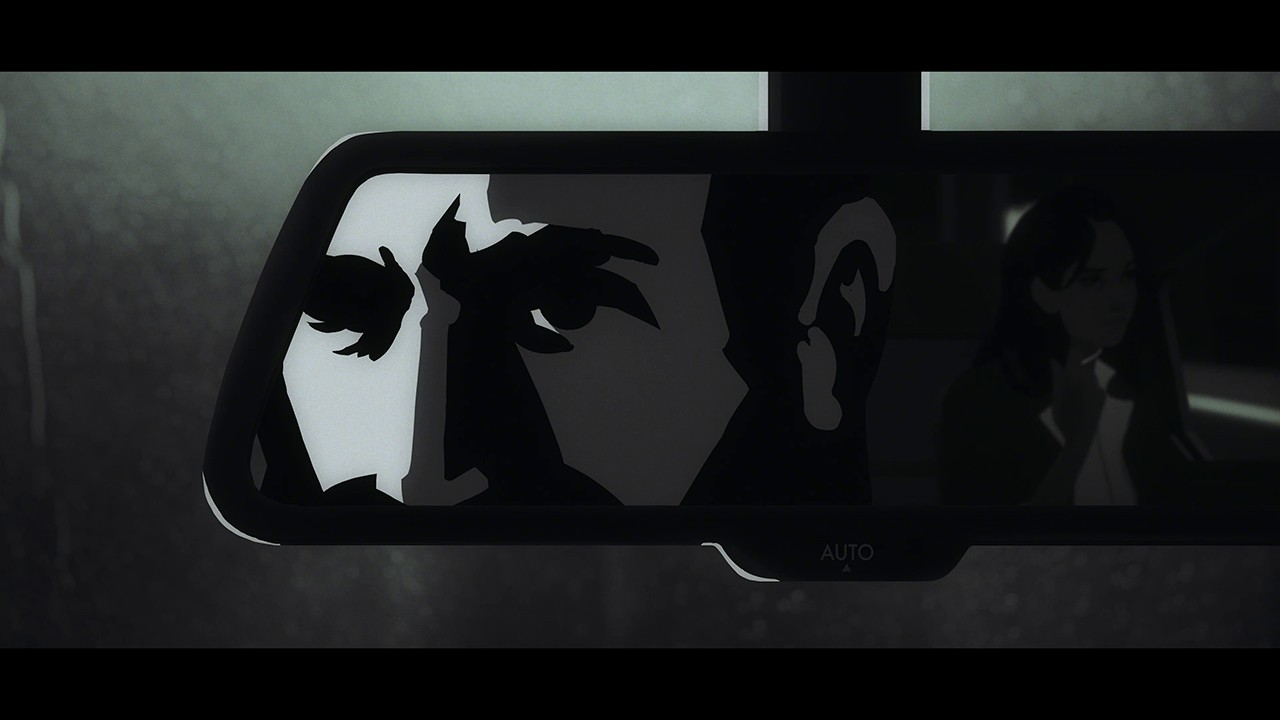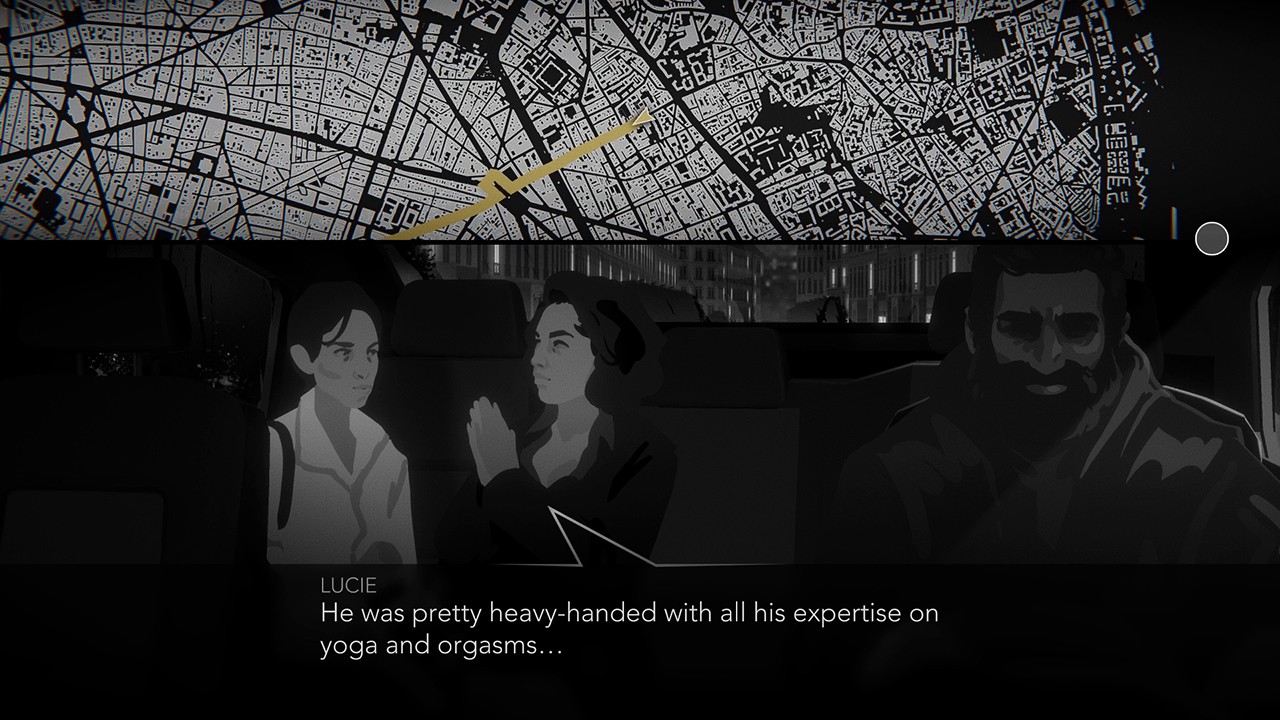
Night Call is a crime noir-style point-and-click narrative-based game about a taxi cab driver that got caught in a string of Parisian murders and is blackmailed by the cops to find the killer while driving his night routes. The game’s colour palette is purely designed in greyscale and gold, and it thrusts you into a classic French noir novel full of dark twists and deadly turns. Many times during my playthrough, I held my breath in suspense wondering if I would live another day after learning more about the story, its characters, and how they all play in the murders around the city.
There are three main missions to play through, each with different ranges of difficulties and more twists and turns than the last. You are tasked with finding three different killers – The Judge, the Angel of Death, and The Sandman. Each mission varies in level of difficulty, where the mystery surrounding The Judge is more clear-cut as opposed to discovering The Sandman, which is more twisted and ambiguous. Bousset, the cop that blackmails you, only gives you six nights to find the killer. You are given a limited amount of money at the beginning, and you make more money in tips if you have good conversations with passengers. The money and time aspects can limit, because you must strategically choose which passengers are worth the time and gas during trips.
Night Call’s greyscale theme and ambient background music help set very specific moods as you pick up different clients. Cut scenes are amazingly cinematic, and it feels like you are thrust into a black and white murder mystery film where you can’t trust anybody… sometimes, not even yourself.
You play as Houssine, an Arab man with a dark past, living in France and covered up in a fake name, address, and the smoke of cigarettes. Not much is known about Houssine at first, but you are instantly thrown into Houssine’s troubled, yet compassionate mind as he is blackmailed to try to find the killers roaming the cold, dark streets of Paris. Night Call does an excellent job of giving the player enough information to figure out the extensive storylines of Houssine and the people he meets. Players learn that there is more to meet the eye than first impressions: if your first drive goes well with one client, they may reappear for another ride later on and reveal a colourful backstory that brings black and white to life.

Night Call was released in 2019, and covers A LOT of political, social, and humanitarian themes. The choice of making Night Call in a limited colour palette of only black, white, and shades of grey add dramatic irony to the characters in the game because nothing about society, and especially law and order, is purely black and white. Each character is fleshed out in such ways that they could be modelled off of real, everyday people going through real, everyday trials and tribulations. My favourite encounters so far have been between Sean, a Black college student from Chicago living in Paris to become a mime, and Jackquie, a prostitute, friend, and long-term friend of Houssine.
Sean’s encounter stuck out the most to me because after a little prying through Houssine’s dialogue options, Sean eventually asks him his opinion on how the police treat Black people in France. With the social climate of what has been going on in the world since 2013’s emergence of Black Lives Matter, six years later in 2020, Night Call pulls no punches in asking players to ruminate on their own perspectives and the grey area between “good” and “bad” – or black and white. In this encounter, I discovered that Houssine is an Arab, and that though he isn’t a Black man’s experience, he has experienced his own run-ins with racism and the police because he admits that in France, you will be targeted if “you look a certain way.” Later you discover Sean is from Chicago, Illinois, and that he had never experienced such racism back home as he did in France.
Night Call does a fantastic job of bringing out a wider narrative of complex ideologies packaged as subplot – brought together in another encounter with Jacquie, a prostitute.
Jacquie was unique because much like Sean, she had her own anecdote with her run-ins with the police, but more specifically, powerful politicians taking advantage of her profession as a sex worker under the shield of night, yet portraying themselves in the light of day as righteously spotless and to not be put under scrutiny. Her encounter – if Houssine plays his dialogue options correctly, she will discuss the hypocrisy of powerful figures in our society. She recollects that the powerful politician is one of her regular customers, and that the police came to her to strong-arm her into not revealing his identity because he was so powerful. She then says that the police, especially used their privilege to solicit her for free just because they are the police, and that they can do whatever they want.
By learning the backstories of each client you pick up, you end up learning more about the driver. Night Call’s writing is clever and candid, and surprisingly very nuanced. You quickly learn that Houssine is an amazing three-dimensional character with a wonderful heart under a gruff, quiet, shielded shell of a man (much to his in-game chagrin). You learn that he was married, and that one of his informants was the man that “stole his wife.” You learn that he had a brother who was killed – and all fingers point to Huussine as the killer – until small tidbits of information are learned that he was given a second chance at life because of his dead brother. Houssine quickly takes on the role of therapist to his passengers, and you realize that sometimes people just really need to talk out their issues to someone willing to listen: and in this case, their cab driver. Besides, what are the odds that they will really see Houssine again?

There are more instances of socially and politically aligned conversations with passengers, but there are also very zany and wild passengers that help lighten the cop-noir mood. In The Judge, a mysterious woman spontaneously appears in Houssine’s cab and claims that she is from the future. She warns that the world and they know it will be destroyed by the antichrist, a demon-child that Houssine will eventually find in The Angel of Death. Players will also come across a black cat as a passenger, and later the cat’s owner, trying to find her pet. Other characters you may come across can be a pregnant woman criticising the UK for Brexit, two women after their date with a potential sperm donor, a vigilante ridding the Parisian streets of scum, self-proclaimed vampires on their way to find their next “kill,” and many more. Night Call doesn’t fail datrawing you in with colourful characters with their own little stories that help add to the bigger picture, which broaden its dark story into something uniquely clever and refreshing to play.
The map’s UI is beautiful and learning the mechanics is fairly easy to figure out. My favourite experience in the game was the beginning, where Houssine wakes up in the hospital bed. The nurse asks him if he could hear her, and if he asks her to speak louder, the subtitle text gets bigger. I thought that was a fun little addition to the UX and makes adjusting the accessibility a function of the game instead of having to navigate towards the menu settings.
The only cons I need to point out from this otherwise amazing game are that, aside from little adaptations regarding different killers, the dialogue largely remains the same throughout each mission. There is a large portfolio of characters you can meet on your night route, but after playing through the first two killers, you will probably have met more than half of them. By then, you’ll already know how to navigate the conversation to get the information or clues that you will need. This repetition makes Night Call drag on a little too slow and was one of the few things I disliked about it.
What is hard about this game is that once you have played through the missions, you probably won’t want to play again more than once. The stress and suspense of the murder-mystery genre adds to the experience, but once you find out who-did-it, that aura is lost. You can finish each mission in about two hours, so you probably won’t get through over eight or ten hours of play time unless you want to win perfect conversations with each passenger. However, for the curious minds who want to learn more about passengers, there is a Free Roaming mode, where you can drive around and find passengers without the limitations of money, wasting gas, or the clock. This is a fun mode if you are interested in learning more about the passengers without losing track of the killer.
If you are looking for a beautifully crafted, point-and-click murder mystery, Night Call is your game.
REVIEW CODE: A complimentary PC code was provided to Bonus Stage for this review. Please send all review code enquiries to press@4gn.co.uk.
Subscribe to our mailing list
Get the latest game reviews, news, features, and more straight to your inbox
Thank you for subscribing to Bonus Stage.
Something went wrong.
Night Call Review
-
Gameplay - 9/10
9/10
-
Graphics - 9/10
9/10
-
Sound - 9/10
9/10
-
Replay Value - 9/10
9/10
User Review
( votes)Overall
Summary
If you are looking for a beautifully crafted, point-and-click murder mystery, Night Call is your game.





